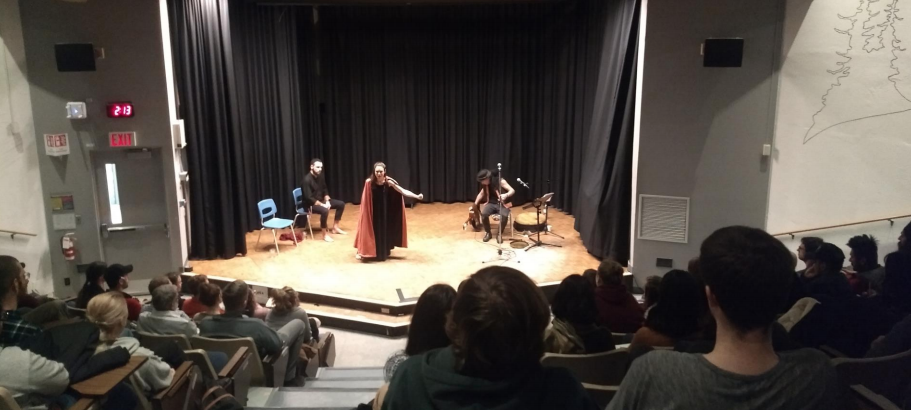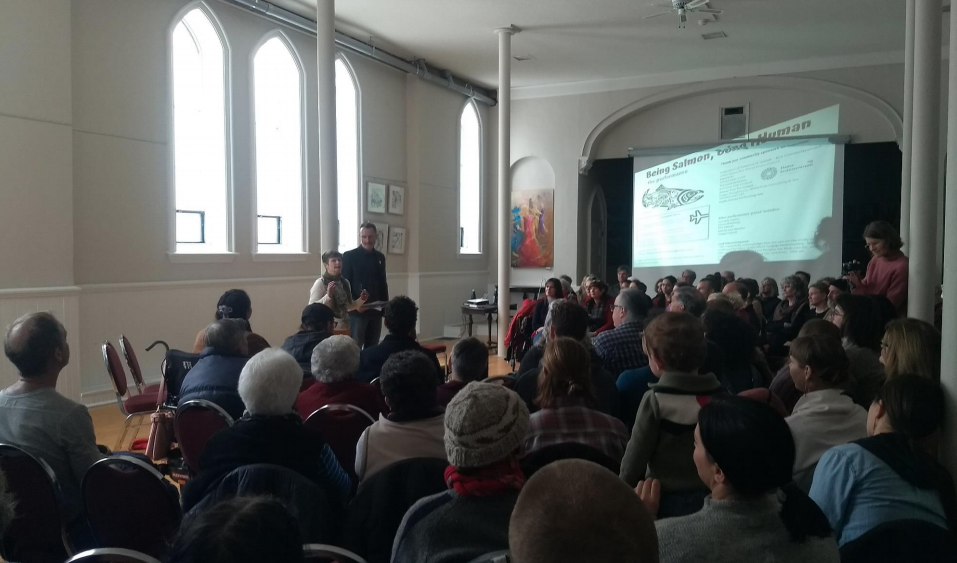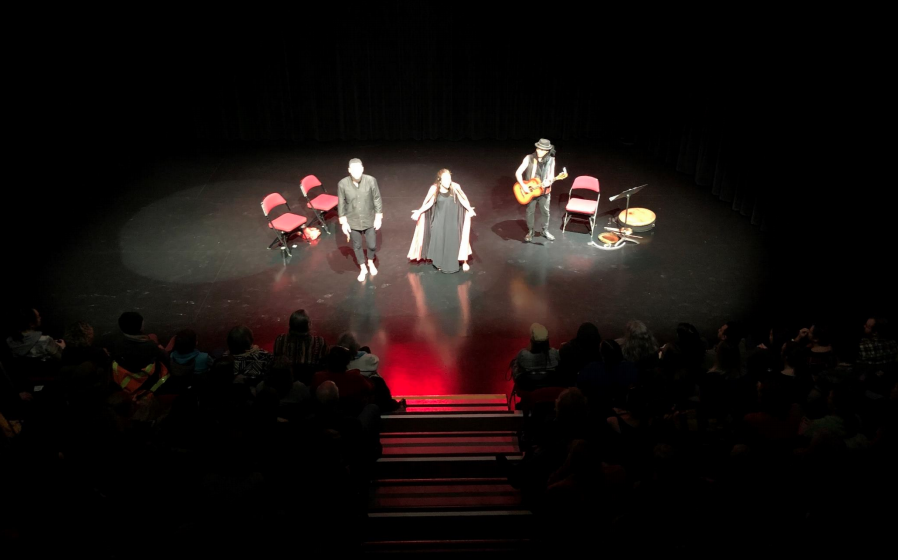From January 26 to February 4th, 2020, the Norwegian-based Being Salmon, Being Human performance traveled between five Great Lakes locations to enliven our relationship with the loss & return of the salmon beings.
The performance is based on the book Being Salmon, Being Human: encountering the wild in us and us in the wild by Martin Lee Mueller, which leaps off the page and onto the stage. Starting in 2016, audiences England, Scotland, Canada, the United States, and Norway have seen this unique and emotional show.
from the promotional materials:
Converting wild salmon into a commodity is a global fairytale that strips us of ancient and ancestral relations with the gift-giving earth. Weaving storytelling and music, this Norwegian-based performance activates our senses and asks for a critical restoration and re-storying of what it means to be a human living within a larger body.
This Blue Community project was able to help bring this tour to the region through our trusted community of water protectors who model and crave a more animated and reciprocol relationship with the living waters. If you would like to stay connected with this long-term and beautiful work, please connect through this form.
The first stop was in Toronto thanks to Bonnie McElhinny and the Water Allies project she coordinates. 110 people came out to this show featuring Martin Lee Mueller (Germany/Norway), Torgeir Vassvik (Sápmi - circumpolar lands of the Sámi people) and Elisha MacMillan — a new member from Ontario who joined the tour this winter, helped revise the script, and had her first performance to an eager full house.
Several of the shows were followed by a local speaker or panel to ground the themes to the places we were inhabiting. In Toronto, Alan Colley, the founder of Toronto Aboriginal Eco Tours talked about Indigenous knowledge and the local relationship to land, water and environment, while making connections to his teachings and themes found in the performance.
CSJ Blue Community animator Paul Baines read the book last winter and could only really explain what it was about by bringing the tour closer to home and letting people experience it for themselves. The performance weaves together traditional storytelling, testimonials, journalism, and salmon-embodiment to poetically invite the audience into empathy, bliss, knowledge, vulnerability, grief, separation, kinship and much more.
No description of this performance would be fair unless you could hear Torgeir Vassvik — the circumpolar sound poet who becomes the person, place, or thing in the show through his joik style of music. At times he provides the soundscape to heighten our experience to the plot and after intense scenes by Martin and Elisha, Torgeir’s music becomes the audiences medicine and medium for fully receiving this encounter with the lives and teachings of the salmon.
With packed rooms and standing ovations, the group did six shows in seven days. The next stops were Lindsay (Fleming College students, thanks to Liz Stone) and Peterborough (Nozhem Theatre & The Mount Community Centre, thanks to Trent staff Joeann Argue, Lee Bolton, and KWIC staff Julie Cosgrove). At Nozhem First Peoples Performance Space, there was a short student enactment of She Sang Them Home — a poem by Leanne Betasamosake Simpson about the return of the salmon nation to the Odenaabe/Otonabee river which flows just next to the theatre. The Mount show featured a panel discussion with:
Dorothy Taylor is Mississauga Ojibwe from Curve Lake First Nation. Dorothy is a community leader and Founder of the Sacred Water Circle.
Olivia Whetung is an artist and beadworker from the area now known as the Kawarthas.
Phil Abbott has researched the impacts of early settlement in Treaty 20 territory as a PhD student in the Indigenous Studies Program at Trent University.
Lake Ontario was once home to one of the world’s largest Atlantic salmon family. But in the late 1800’s the territory was forcibly settled by European immigrants, farming, and a colonial world-view that sees nature as a dead and expendable resource. Logging and lumber mills, the Trent-Severn Waterway, hydro-electrics dams, overfishing, pollution, and a mix of laws and practices devastated the lake and its inter-connected lands, rivers, streams and the lives that depend on these places. The Michi Saagiig Nishnaabeg nation were in respectful relation with the salmon nation since time immemorial and in less than 120 years, artifishal spawning programs are all that is left. One historic salmon location was (what is now known as) Cobourg where the tour went next.
The Sisters of St. Joseph run the Villa St. Joseph Ecology and Spirituality Centre right on the Cobourg shores of Lake Ontario (which Martin affectionately started calling Lady Ontario). Once known as ‘Salmon City’, the Being Salmon performance was at home here — a prayer offered by the artists and received with deep gratitude, grief, and a shared connection with spirit. Adding another 40 people to the 300+ who had already seen the show, this was an intimate encounter followed by a soulful discussion and reflection. Thanks to Sister Linda Gregg at the Villa for hosting this performance.
After the show, the tour members visited the local and infamous dam that inhibits the return of spawning salmon. Martin stood before these falls for some time, but only after the group got childishly excited by the dance of some fish in this creek — Torgeir’s songs might have sang them home.
The most visually spectacular show was saved for last. Thanks to the organizing work of Joelle Rondeau (Indigenous Studies PhD student at Trent) this 100+ person performance was hosted in the Planetarium: Space for Life with 360 degrees of landscape projections within a sound-cocoon dome. There was also a panel discussion to follow with:
Curtis Lazore, Environmental Assessment Officer, Mohawk Council of Akwesasne Environment Program
Evelyne Daigle, Educator - Scientific conceptor, Biodôme de Montréal
Thibault Rehn, Coordinator, Vigilance OGM (Genetically Modified Organisms advocacy group)

Ending in the St. Lawrence river, the tour connected salmon allies from fresh to saltwaters. Plans are in the works for starting new encounters along these wateways for salmon restoration and what Martin called “restorying” — shifting the stories we tell about our relationship with salmon and returning to a kinship respect for all life. There are also plans to visit the Atlantic region this summer so visit their fundraising page.
There will be more to share about this salmon journey, but for now we will leave you with an excerpt from the book. What if the salmon are calling us home? If we listen, what might the salmon be telling us?
FROM THE BOOK:
What if, despite all this, the salmon are already laboring to bring the human animal back into a more reciprocal participation with Earth? What if they are already influencing the wounded thinking mind, offering to guide it out of its long quarantine? They might already be speaking to those two-legged apes on land – those of us who, like many others, are so drawn to their delicious flesh.
You seem a bit lost and helpless at finding your way to where you belong. Let us give you a fin. We know a thing or two about navigation, so we might be able to help you steer out of your loneliness. Relinquish that self-centered sense of control and entitlement. Invite that embodied mind of yours to embrace its own vulnerability. Let us feed you on terms our nations have agreed on together, not on terms imposed upon us by you. Recognize us in the uniqueness of our individual lives. Accept that there are times when we choose to feed you, and there are times when we must hold back. Remember our obligation to feed not only you but many others, too. Remember your obligation to make return gifts to us. Give us the gift of your full-bodied attention, your curiosity, your feelings, your intuition, gather your senses before you decide to take some of us, for then it will be easier for you to celebrate and regulate the links that connect our species. When you use tools to catch us, embed them into social practices that absorb any potential that you might become too proud. Integrate all your actions, and all your tools, fully into gift-giving cycles. Review the complex ways in which we salmon still enrich your embodied mind with metaphor, with concepts, with insight. Gift us with good stories and thoughtful practices, with careful speech, with song, with dance. Reclaim your sense of being an embodied intelligence, here alongside us, inside this living Earth.
If you saw the performance, please let us know what you thought and felt. Everyone’s reflections on this post are welcomed and appreciated.
By Paul Baines
















ความคิดเห็น